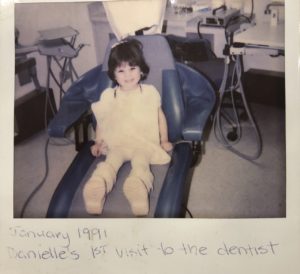Oh Baby! Caring for your baby’s teeth and gums.
Dental health starts before there are any teeth to brush! Caring for your baby’s teeth early on develops good oral hygiene habits for the future.
Before your child has any teeth it is important to clean the gums after each feeding with a warm, wet washcloth. You can also buy “thimble” style rubber gum stimulators to brush your baby’s gums.
Teething is difficult, but there are a few things you can do to help. Rub your baby’s gums with a clean finger or a clean washcloth. Many babies find the applied pressure comforting. Keep their mouth cool with a cold washcloth, spoon, or chilled teething ring. If your child is already eating hard foods, offer them something to gnaw on like chilled cucumber or carrot. Keep close watch as they chew as any broken off pieces pose a choking hazard.
Baby teeth are important too. A common misconception in adults is that primary teeth do not need special care because they eventually fall out and are replaced by our permanent teeth. But these first teeth preserve the spacing for the permanent ones and help Baby chew and talk. If they’re not cared for properly they can decay, leading to a gum infection called gingivitis, which can affect the spacing of permanent teeth.
Put them to bed with water. The first sign of decay in your child’s teeth is discolouration and minor pitting. Putting your child to bed with milk or worse, juice, is notoriously bad for their teeth. This allows sugars to sit in their mouth and breed bad bacteria all night – water is the safest bedtime beverage.
For more tips on brushing and cleaning your child’s teeth see the Canadian Dental Association Website: http://www.cda-adc.ca/en/oral_health/cfyt/dental_care_children/cleaning.asp
To book your child’s first dental check-up, contact us today by phone (604) 936-1263, or email https://austindentalgroups.com/contact/

